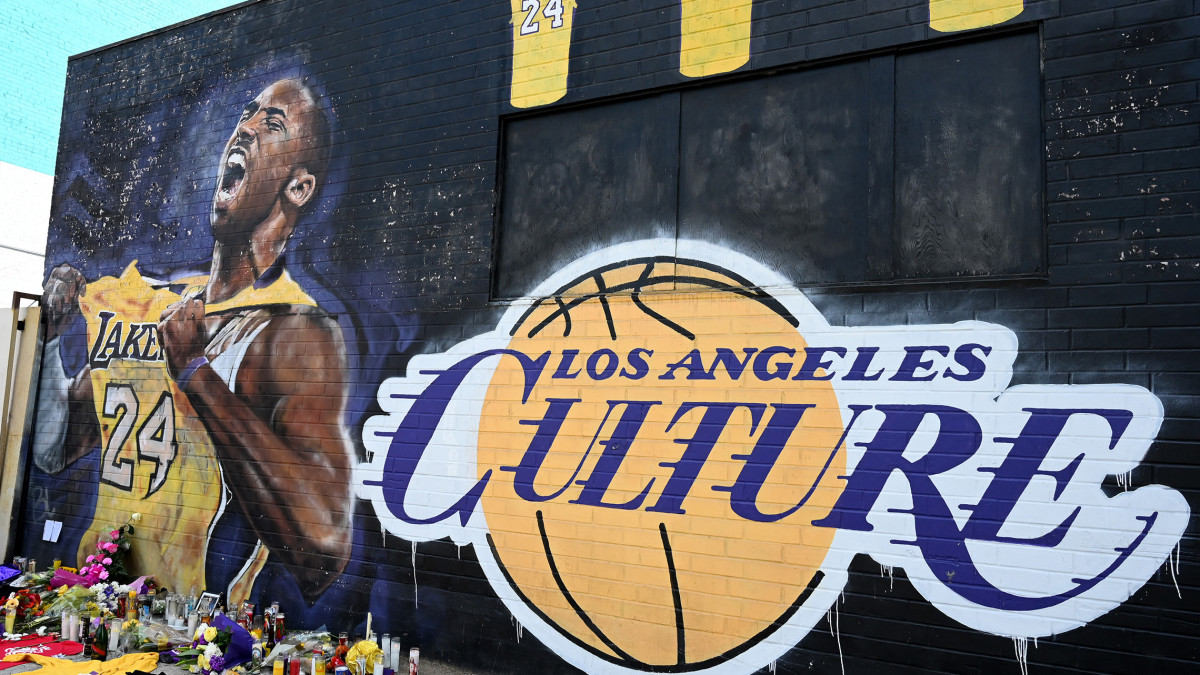Kobe Bryant’s Spirit is Still Alive Across Los Angeles

LOS ANGELES — The 101 is usually not a memorable place. The freeway is either too crowded to drive on, or so empty you happily zoom along to your final destination blissfully unaware of your surroundings. In Los Angeles, one day after the death of Kobe Bryant, the Lakers legend’s specter still very much hangs over the city. So much so that it’s impossible to miss a freshly painted piece of art on a wall overlooking the 101 headed west from Staples Center—bold, block purple letters with a succinct message: Kobe Forever.
There are tributes to Bryant all over Los Angeles, perhaps none more striking than the one just outside Staples. In the shadow of the arena is a living, breathing memorial. Video screens simply display an image saying “In Loving Memory of Kobe Bryant.” The restaurants surrounding the arena play Kobe highlight videos on TVs. And the patch of concrete normally reserved for fans spilling in and out of games is now filled with flowers, balloons, basketballs, jerseys and whatever else people could find to pay tribute to their fallen star.

You may see a fan in tears, you may hear another yell “Kobe!” while facing the sky. You’ll see people of all ages, maybe even some pets. And you’ll see people of all races and backgrounds, a rare moment in which the suited power lunch crowd is mingling with the immigrants in Laker gear.
The grieving process for Kobe has begun worldwide, but it’s no more clear the personal connection he had to wide swaths of people than in Los Angeles, where he managed to be both white-collar and blue-collar, both glitz and glam and bootstraps. His championship success and celebrity appealed to the one-percenters, while his self-written narrative of a work-obsessed tyrant stirred passion in nearly everyone else.
As Bryant is mourned and his legacy canonized, it’s the wide spectrum of his meaning that sticks out. The sudden and shocking nature of Bryant’s passing makes him perhaps the first celebrity death since the Me Too movement began to test how the public will reckon with powerful men who, while having a direct impact on so many lives, were also credibly accused of sexual assault.
Bryant may not be more complicated than any other person, but it’s impossible to deny the genuine connection so many people felt to him. Maybe it’s always been stupid how much athletes have been lionized, and what that lionization has allowed them to get away with. I have no personal connection to Bryant. But I empathize with the Brown people who I saw shaken over his death. I can’t speak to the experience of every immigrant basketball fan, but sports made me feel American, and my sports heroes not only symbolized work ethic, but made me feel like a part of my community—as well as serving as a way to engage with people who didn’t look like me.
And you only need to hear from the younger generation of NBA players to see what Kobe meant to so many Black kids, from Philadelphia to Los Angeles and everywhere in between, who tried to emulate everything from his elbow jumper (itself an emulation of Michael Jordan) to his in-your-face work ethic.
None of this is to say you can deny the pain of women who see Bryant as another person alleged with a heinous act who was able to comfortably re-enter his famous life. I believe in redemption and rehabilitation. But I’m not sure what the roadmap to that is, it’s not for people like me to decide, and those steps are still being defined even as some people think simply staying quiet for a little while is enough to be back in the public’s good graces. (And unfortunately, that strategy has mostly worked.) There‘s still debate as to the level of accountability Bryant took for 2003. Some believe he’s shown more than anyone else; others find his role as an advocate for women as specious.
To some, like survivors and victims, Bryant will always be the person who got away with something and never truly had to reckon with it. To others, like those who left tear-soaked messages on the pavement outside Staples, he was a literal inspiration, a larger-than-life figure who was still real enough to encourage you to take the next step. And those categories are hardly distinct. The lines are blurred, and you may belong to both groups, or switch back and forth in the days to come. It all feels appropriate. Your individual feelings don’t need to be policed at this exact moment, but a hero to some is not a hero to all.
I want to believe Bryant’s human dignity can be preserved while honoring survivors, not because of any fealty to him, but because I want to live in a world in which a simple good/bad dichotomy isn’t applied to people like him. No one has actually been cast aside in the way bad-faith “cancel culture” critics fear, but it’s also unclear what genuine reflection and proper repentance look like, at least for public figures with such immense stature. I hope Kobe ended up on the right side of that ledger in the way I hope every human being does, but that’s impossible for me to know, and inappropriate for me to project.
What the scenes in Los Angeles make abundantly clear is Kobe’s story doesn’t need to be separated into an “on-court” section and an “off-court” one as a way to more easily digest the totality of his impact. It’s not as simple as one being comfortable to discuss and the other a euphemism for his more unsavory acts. Bryant’s off-court chapter includes the sexual assault allegation; it also includes all the people he inspired to live their lives a little prouder. That may sound foolish. To so many of the Angelenos broken over his death, many of whom have been marginalized in their own right, it appears that’s how they’ll choose to remember Kobe.
